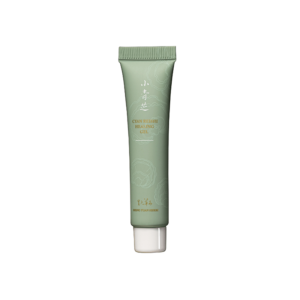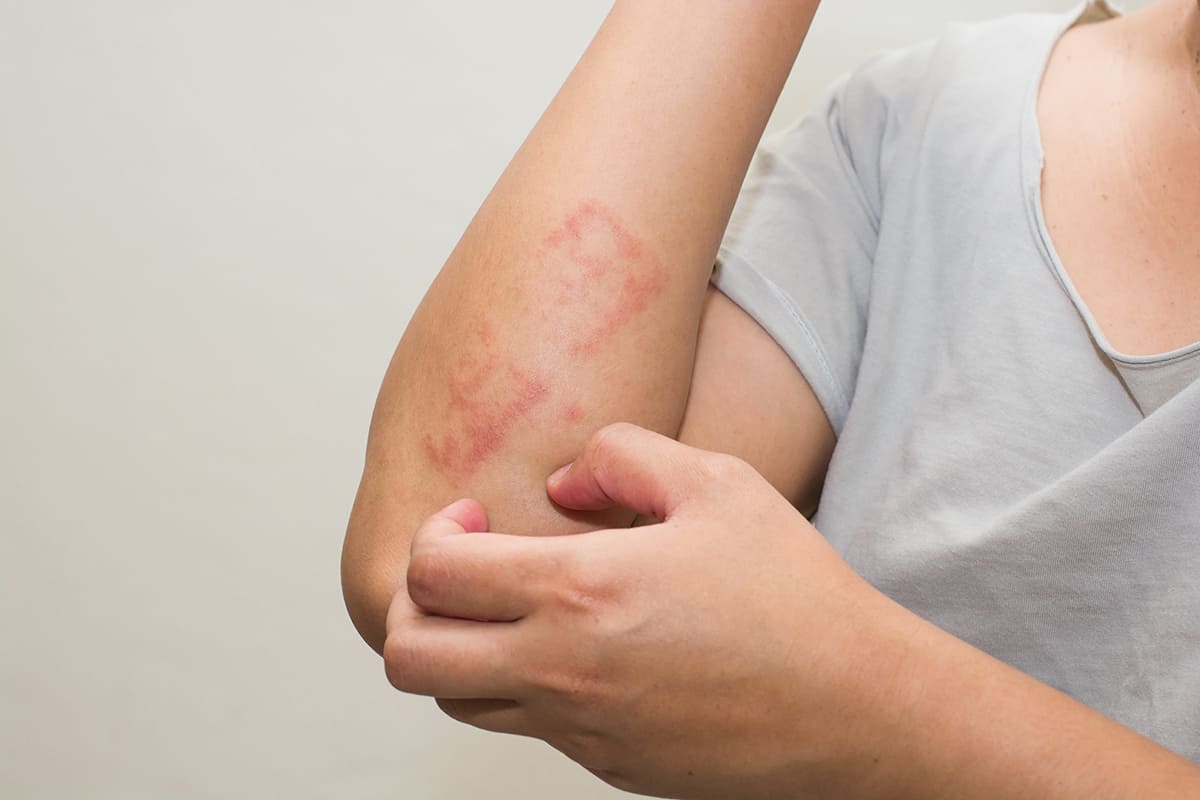
Is your skin itchy and sensitive during seasonal changes? Here are 4 tips for relieving skin allergies, effectively combating allergic redness and swelling symptoms.
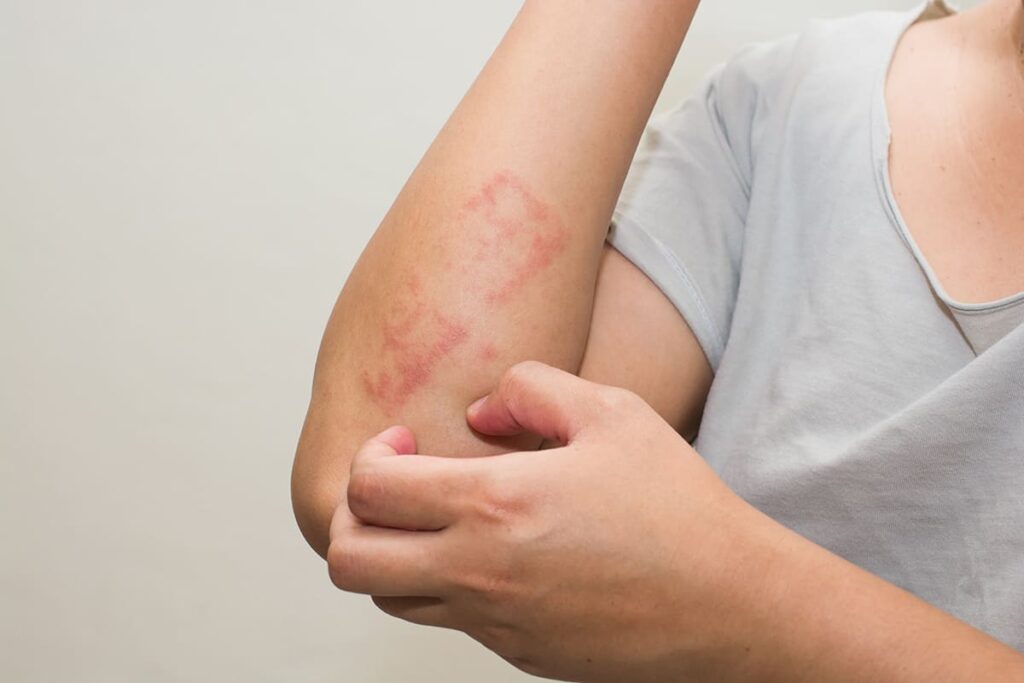
Do you experience occasional itching or redness on your skin?
Skin allergies are a common headache for many people. Apart from the influence of seasonal changes or weather, allergens encountered in daily life can also potentially irritate the skin, affecting daily routines and quality of life, and may even develop into chronic conditions with long-term effects.
What are the causes for skin allergy?
Skin allergy refers to an excessive skin reaction produced by the body’s immune system in response to foreign substances, known as allergens.
There are many reasons that can cause skin allergies, including genetic factors and diet. Skin allergies can also be triggered by environmental sources that come into contact with the skin, such as pollen and dust, which can easily lead to allergic reactions in the skin.
Additionally, an irregular lifestyle and hormonal imbalances can result in a weakened immune system and reduced skin repair capacity, leading to discomforting symptoms such as redness, warmth, itching, stinging, and rashes on the skin.
1. Genetic
Allergic diseases are closely related to both genetic factors and external environmental factors. “Genetics” is a major risk factor for allergic diseases. If parents have a predisposition to allergies or the disease itself, the likelihood of it being inherited by the next generation increases. If a genetic predisposition to allergies is combined with exposure to environmental factors that trigger allergies, it can lead to allergic diseases.
2. Diet
Common dietary triggers for skin allergies often include shellfish and nuts. Excessive consumption of fried foods and sugary foods can also lead to protein abnormalities, triggering skin allergies. Fruits like mangoes and photosensitive vegetables such as rapeseed, asparagus, bok choy, spinach, celery, mustard greens, and amaranth can potentially cause symptoms like redness and rashes on the skin.
3. Stress
Under specific conditions and stimuli, such as during a woman’s menstrual period, pregnancy, or hormonal imbalances from menopause, lack of sleep, high stress, emotional fluctuations, and endocrine disorders, various skin overreactions are more likely to occur.
4. Diseases
Conditions such as urticaria, atopic dermatitis, eczema, immune dysfunction like psoriasis, endocrine disorders like diabetes, varicose veins, malignant tumors, and others can all potentially lead to skin allergy symptoms.
5. Other Factors
This includes factors like dust, pet fur, seasonal pollen, cosmetics, insect bites, and drug allergies, among others.
What are the common symptoms of allergies?
When the skin is allergic, the body’s immune system secretes ‘histamine’ to combat allergies, triggering a series of inflammatory reactions. Common symptoms include itching of the skin and may also include symptoms such as skin rashes, peeling, dryness, blisters, and localized swelling.
Common skin allergy symptoms include:
1. Urticaria
Urticaria is mainly caused by the stimulation of mast cells under the epidermis, releasing histamine, leading to symptoms such as skin inflammation, swelling, and itching. Consumption of allergens such as shellfish and nuts can easily trigger urticaria. It usually subsides within 24 hours after exposure to the allergen, but if it recurs, it can develop into chronic urticaria.
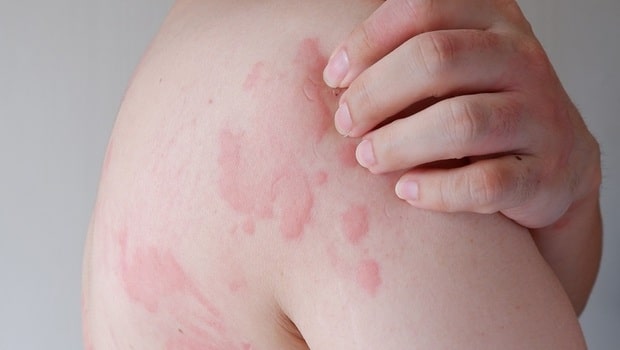
2. Eczema
Eczema is a general term for many types of skin inflammation, characterized by redness, swelling, and oozing.
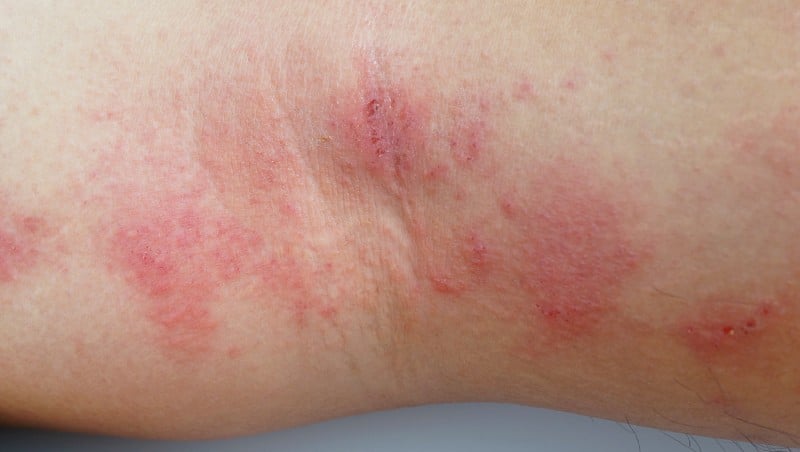
3. Seborrheic Dermatitis
Seborrheic dermatitis is most likely to occur when the temperature is unstable during seasonal changes, leading to abnormal sebum gland secretion, resulting in an increase in the presence of Malassezia yeast on the skin’s surface.
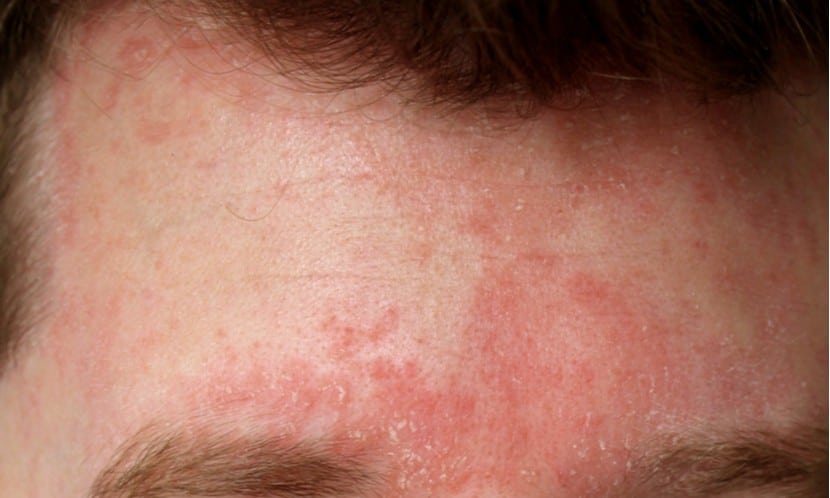
How to reduce itching from skin allergies?
When experiencing itching due to skin allergies, you can consider the following methods to achieve relief from itching:
1. Cold Compress
Cold compress can constrict blood vessels, reduce cell activity, and alleviate inflammation. For skin allergies causing symptoms like redness and itching, you can use an ice pack or a towel soaked in cold water to apply to the affected area to relieve the symptoms.
2. Massage the Skin with Moisturizing and Locking in Hydration Skincare Products
In particular, vitamin E can be effective in relieving itching caused by skin allergies. With Ganoderma GMI protein, Cyan Reishi Advanced Repair Gel and Cyan Reishi Healing Gel products from Sheng Yuan Herbs have simple ingredients and are colorless, odorless, and non-toxic without side effects. These quick-absorbing gel products can alleviate skin itching symptoms, help improve skin issues, and enhance skin protection.
3. Adjust Diet and Lifestyle
4. Identify Allergens and Avoid Contact
Such as certain foods, cosmetics, laundry detergents, pollen, etc.
5. Medications
Under a doctor’s guidance, you can use oral or topical antihistamines and steroids. These can relieve allergy symptoms and reduce discomfort such as itching and pain.
6. Reduce Stress
Excessive stress can affect the body’s immune system, making the skin more susceptible to irritation.
7. Adequate Exercise
Exercise can boost the body’s immune system, improve metabolism, and the circulatory system. However, excessive sweating can also lead to skin irritation.
8. Adopt Healthy Habits
Developing good lifestyle and sleep habits, avoiding smoking and excessive alcohol consumption can help prevent and alleviate skin allergies.
9. Wear Loose and Breathable Clothing
Avoid scratching; gently pat the irritated skin instead.
10. Avoid Over-Cleansing the Skin
Regularly maintain cleanliness, avoid water that is too hot as it can strip the skin of its protective oils, making it more prone to dryness and itching. Use mild, non-irritating bath products. After bathing, it is recommended to drink plenty of water to replenish lost fluids.
11. Seek Medical Assistance
For skin allergies, you can seek help from dermatologists, family medicine practitioners, or rheumatology and allergy immunology specialists. Traditional Chinese medicine may focus on relieving pain, clearing heat, eliminating dampness, and detoxification to help the body metabolize allergens and alleviate symptoms.
How to Relieve Swelling from Allergic Reactions?
Allergies are an overactive immune system response that can cause symptoms such as skin redness, fever, pain, and itching. You can consider the following methods for relief:
1. Avoid or Reduce Exposure to Allergens
This is the natural way to alleviate allergies.
2. Reduce Stress in Life
Mental fatigue and hormonal changes during the menstrual cycle in women can weaken the immune system, worsening skin allergies. Adjusting your daily routine and improving sleep quality can boost the immune system and help alleviate skin allergies.
3. Seek Medical Assistance for Medication
Using antihistamine medications is the primary approach.
4. Utilize Suitable Skincare Products for Improvement
Use skincare products that contain effective soothing ingredients to help reduce discomfort symptoms and prevent allergic reactions from recurring or worsening. Sheng Yuan Herbs’ versatile skin repair products, “Cyan Reishi Advanced Repair Gel” and “Cyan Reishi Healing Gel ” , which contain Ganoderma GMI, are pure, colorless, odorless, and non-toxic without side effects. They can help repair and soothe the skin, making them particularly suitable for alleviating symptoms from skin allergies.
How Should You Adjust Your Dietary Habits to Alleviate Skin Allergy Symptoms?
If skin allergies are caused by food, dietary adjustments can be a starting point for relief. A balanced and mild diet with a focus on consuming a variety of nutrients is essential. Preparing meals using seasonal, fresh, and naturally safe ingredients can help regulate your immune system and reduce allergic reactions.
Reduce or avoid consuming foods that may trigger allergies, such as seafood, peanuts, milk, fresh soy products, eggs, wheat, etc. Increase your intake of fresh fruits and vegetables.
Avoid spicy and stimulating foods like coffee, Sichuan peppercorns, chili peppers, and black pepper. Also, be cautious with foods high in histamine, such as pickled and fermented foods.
Below nutrition supplements are recommended to ensure you receive a well-rounded nutritional intake:
1. Vitamin C:
It has the ability to inhibit histamine, reduce allergen invasion, and its antioxidant properties can eliminate free radicals in the body, accelerating metabolism and skin repair during skin allergies. It strengthens the immune system and reduces inflammation.
Recommended foods: Lemon, guava, tomatoes, kiwi, green vegetables.
2. Probiotics:
Probiotics help maintain a balanced gut microbiome, regulate the immune system, and improve allergy symptoms.
Recommended foods: Yogurt, kefir.
3. Vitamin D:
It enhances the immune system, prevents and alleviates allergies and inflammation.
Recommended foods: Eggs, milk, salmon.
4. Vitamin E:
It possesses anti-inflammatory properties and helps treat inflamed skin, reducing allergic reactions.
Recommended foods: Nuts.
5. Fruits:
Cherries are rich in anthocyanins, quercetin, and tannic acid, with strong anti-inflammatory capabilities that reduce histamine production in the body.
Grapes contain a significant amount of grape polyphenols, which can help clear free radicals and inhibit histamine secretion, preventing skin allergies.
6. Oils:
When cooking, it is recommended to use oils high in Omega-3, such as flaxseed oil and canola oil.
7. Hydration:
Consuming an adequate amount of water regularly can alleviate inflammatory responses during skin allergies.
Recommended Topical Ointment for Skin Allergy Relief
In addition to understanding the causes of skin allergies, their symptoms, and methods for prevention and improvement, don’t forget to choose suitable products to address troublesome skin issues. When your skin experiences allergies, itching, redness, and swelling, it is recommended to use ointments that contain the following ingredients:
1. Moisturizing Ingredients:
If you simply have itchy skin, you can use ointments containing moisturizing factors such as Vaseline or urea. These can be used to treat dry and keratinized skin. Topical ointments containing vitamins A, D, and E are also beneficial as well.
2. Medicinal Ingredients:
Antihistamines can alleviate itching caused by mosquito bites and the like.
Corticosteroids have anti-inflammatory, immunosuppressive, cell growth inhibition, and vasoconstrictive properties, and are effective in treating skin inflammation.
Antibiotics can effectively reduce itching and inflammation.
Sheng Yuan Herbs’ “Cyan Reishi Advanced Repair Gel,” which contains Ganoderma GMI, is an all- natural and non-toxic skincare product compared to topical skin ointments containing corticosteroid ingredients, which may have side effects. It is gentle and non-irritating, making it suitable even for infants.
Cyan Reishi Advanced Repair Gel’s texture is light and non-greasy, making it suitable for pre-makeup skin preparation. The colorless and odorless gel is quickly absorbed, leaving a natural and smooth finish for makeup.
Sheng Yuan Herbs also offers a convenient travel-sized version called “Cyan Reishi Healing Gel” that you can carry with you and apply as needed to alleviate skin allergy symptoms.
Let Sheng Yuan Herbs assist with enhancing your skin’s protection against the troubles from skin allergies!
-
 Cyan Reishi Healing Gel$8.99
Cyan Reishi Healing Gel$8.99



